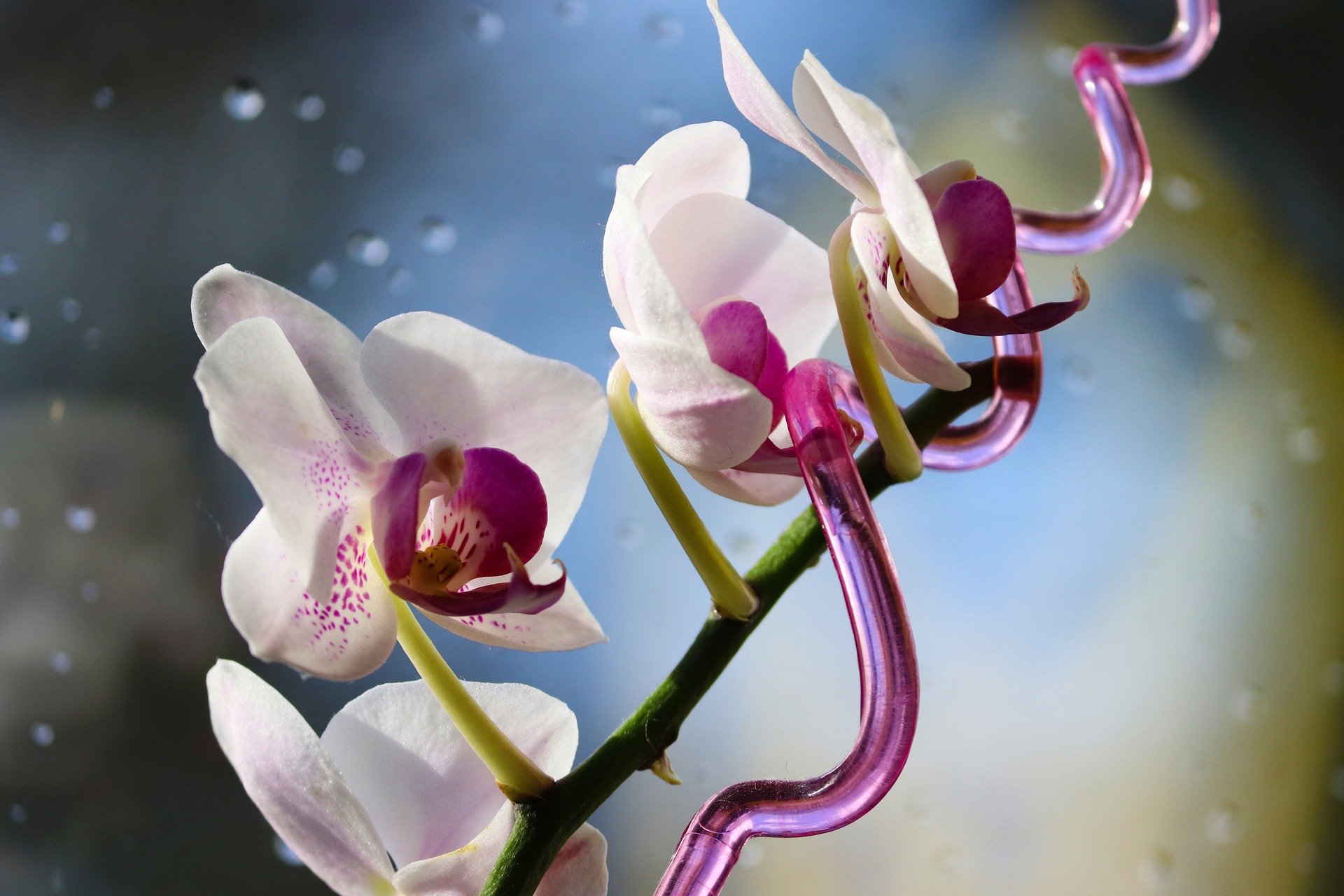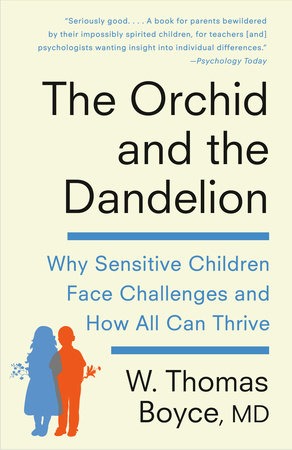I think I’ve finally found a good to describe Third Factor‘s core audience: orchids.
I first heard the metaphor of orchids and dandelions a few years ago. As I understood it, orchids have the capacity for remarkable blooms, but only if they get precisely what they need to thrive; dandelions, on the other hand, are hardy enough to bloom practically anywhere. Recently, I learned that the metaphor is also the title of a book by the pediatrician, psychiatrist, and professor who adopted the phrase dandelion child from a Swedish and coined the term orchid child to complement it. The title of the book is The Orchid and the Dandelion: Why Sensitive Children Face Challenges and How All Can Thrive, by W. Thomas Boyce, M.D., and now that I’ve read it, I want to enthusiastically recommend it to Third Factor readers, because I’ve never seen a book that so precisely explains who and what we are.
What is an Orchid?
As I learned from the book, the notion of orchids and dandelions is more than just a clever metaphor for something we all might have observed: it’s a description of something that Boyce and his team documented through rigorous, longitudinal research into children’s stress responses. It turns out that some of us just have stronger physiological responses to stressors at a neurobiological level. Orchids are those whose cortisol surges more powerfully, whose fight-or-flight kicks in over lesser stimuli, and who are otherwise generally more physiologically reactive than their dandelion friends.
That much probably won’t surprise anyone who’s read about overexcitability. But here’s the kicker: while it’s true that the sickest kids in Boyce’s study were orchids, the healthiest were, too. As Boyce explains:
The children in question had about them an exquisite sensitivity to the character and nature of both aversive and supportive surrounding social environments. They foundered in bad environments and thrived in good environments for the same remarkable reason: they were more open, more permeable, more tender to the powerful influences, both bad and good, of the contexts in which they were living and growing. (47-8)
In other words, orchids aren’t simply “vulnerable.” They do bear more of the cost of poor environments, but “when reared in supportive, nurturing settings, they disproportionately prospered and thrived.” (48)
You Say Orchid, I Say Overexcitable
When I was reading this book, I thought a lot about the purpose of Third Factor and why I started it in the first place. I originally launched it as a sort of complement to my own effort to build a nontraditional, creative, productive life. I knew there were others out there trying to do the same thing, though it was hard to come up with language to describe us as a whole (and harder still to come up with terms people would think to plug into Google).
The overexcitabilities of Kazimierz Dabrowski’s theory of positive disintegration, however, hit pretty close to the mark. I’d noted before that the five domains of overexcitability—the intellect, the emotions, the imagination, the psychomotor, and the senses—seemed to resonate with creative people and others who seek to live this sort of life, and to be a good place to ground the sort of conversations I hoped to have.
In The Orchid and the Dandelion, you’ll repeatedly come across descriptions of orchids that line up with what we describe when we talk about overexcitability. We meet orchid children who hate the feeling of wrinkled socks in their shoes; who are tremendously sensitive to the emotional color of choral music; who are particularly creative and imaginative and have a need to express that creativity; and whose emotions could be described as more reactive than the norm.
The Diverging Paths of Orchids
After walking you through the relevant science, Boyce offers eight case studies of adults who had been among the children he studied: four orchids and four dandelions, two each who grew up under optimal conditions and two each whose conditions left something to be desired.
In the comparison between the two pairs of orchids, I saw a gap that I’ve seen among my offline friends and that I see amplified in Third Factor‘s audience. The two orchids who grew up in a metaphorical tropical rain forest, where their needs were pretty much optimally met, thrived. These two individuals were very different, to be sure. One was calm and one was energetic; the former was naturally sociable while the latter didn’t fit in with the other kids, though his classmates did vote him “Most Likely to Become a Millionaire.” But both had their unusual needs met, and by their early thirties, both were clearly on tracks to successful, fulfilling lives.
Then we have the two who grew up like orchids “in frigid Alaskan office buildings,” as Boyce puts it. Now, they aren’t living horrible lives or anything like that. They have managed to find jobs and stability in life, though neither has a dream job. But they had struggles that the other orchids seemed to escape. They were likely to experience physical maladies such as chronic gastrointestinal distress. And while their rainforest-raised counterparts were confident, these two thought of themselves as “weird.” As an outside observer reading only what Boyce tells me about them, it seems to me that the first pair were every bit as “weird” as the second. But I’d guess they thought of themselves as “elite” rather than “weird.” Instead of belonging to a community where everyone shared their artistic or intellectual impulses, the two struggling orchids were socially marginal in high school: one hung out with the quirky artists, the other with struggling misfits.
Now, being “weird” is not so bad in itself. But what’s particularly sad about them, especially when compared to the other two orchids, is that these two are struggling to find joy, passion, and purpose. Like an orchid in an Alaskan office building, they seemed lost.

“Orchid” or “Gifted”?
The thing about the word “overexcitability” is that you find it most often in groups talking about “giftedness.” Regular readers will know of my ambivalence toward the word “gifted,” which we’ve used despite my misgivings to hit that search engine sweet spot. The thing is, adults who are searching for what it means to be “gifted” generally aren’t doing it because they’re feeling fulfilled and successful. Those “gifted” adults just go about their lives, perhaps thinking of themselves as elite, but never doing anything so gauche as talking about this fact in public.
But then you talk to therapists who specialize in this thing we’ve called giftedness, and you get the other side of the story. The issues these therapists tend to deal with line up well with the struggles faced by orchids raised in frigid Alaskan office buildings. Paula Prober, a therapist who works with gifted people and who coined the term “rainforest mind” to describe her clients, talks often about “chainsaws”—those people and other forces that cut those rainforests down.
Now, I’m no expert; I’m just a writer who participates in this sphere. But I have no doubt that Paula’s clients are, by and large, those orchids who grew up in suboptimal environments.
Let me be clear, as Boyce is in the book: an orchid is a difficult plant to coax into bloom. Judging from the stories I read here in this book (and that I have witnessed in real life), the environment doesn’t have to be terrible for the orchid to struggle. I appreciated the kindness with which Boyce treated the families of these orchids, who he makes clear have done the best they possibly could to raise these very particular plants. Nor is it the fault of the orchid that it is what it is. Boyce talks in the book about research into stressors that are passed down via epigenetic effects through the generations. Am I as biologically reactive as I am because my grandma sailed alone across the Pacific while pregnant with my mom, to meet her military officer husband in a country on which we had dropped two atomic bombs three years before? If I am, whose fault would that be? It makes no sense to ascribe blame.
Whither Now, Orchid Readers?
But really, my life hasn’t been so bad. I found myself relating at times to both the lucky orchids and to the unlucky ones. I’m still determined to fulfill my dreams. At worst, I feel thwarted, and sometimes lost, and would like to find other people who are weird gifted quirky wired like me, with similar goals, so we can compare notes and help each other be more like the orchids growing in the tropical rain forest and less like those growing in the Alaskan office building.
But the worst outcome for an orchid isn’t merely feeling weird and a bit lost. Boyce describes one example in particular—that of his younger sister, a quintessential orchid—whose life was plagued by serious mental illness and ultimately ended in suicide.
And through Third Factor, I’ve connected with orchids who fit all three paths: the illustrious one, the devastated one, and the one where we muddle along in the middle, always trying to reach higher. I always wondered why that is—why people with such a wide range of experiences related to what we publish here at Third Factor. Reading Boyce’s studies of the wildly diverging paths taken by orchids helped me understand why. I always feel sad that I can’t to more to help those who are planted in places where it’s particularly difficult to blossom. I also know that those who seem to others like they’re blossoming beautifully sometimes have a sense that they could do still more, if only they had some plant food formulated specially for orchids.
In the end, though the book focuses on what we can do for children and not for orchids who have grown up, it left me feeling hopeful. Understanding something about myself made me feel more optimistic about my own efforts to put out a few new blossoms. If you or someone you love has been an orchid who was left to wilt, this book will not be an easy read, because it will get right to the biological heart of what has happened to you. But for those of you determined to bloom despite being potted in that frigid office, you might find some insight here that can help you put out those buds.
Interested in Checking it Out?
- See if you can find it in a library near you.
- Or Barnes and Noble might have it on the shelf.
- Better World Books might have a used copy.
- If you buy it at Amazon, you can follow this link to give 10% of the profit back to Third Factor.





